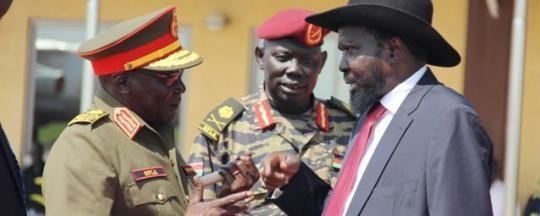The African Union Commission of Inquiry on South Sudan has concluded in its final report on the crisis in the country that President Salva Kiir is “overly powerful” under the terms of the current transitional constitution of 2011 and recommends creating a new constitution that separates powers and creates checks and balances on executive power.
Members of the inquiry panel suggested that constitutional powers given to president were “extraordinarily wide and apparently all-pervading… with very limited checks and balances in place.”
They concluded that constitutional provisions coupled with contextual factors “result in an overly powerful executive,” according to Article 1010 of the AUCISS report. It cites the weak legislature, lack of commitment to separation of powers and independence of the judiciary and structural links between the legislature and the executive as relevant factors.
Kiir’s manner of exercising his constitutional powers also helped lead to the crisis, the report alleges, citing specifically Kiir’s exercise of consitutional powers to remove state officials, which was “one cause of instability,” according to Article 1011 of the report. Kiir had removed several governors in the months before the start of the civil war, appointing caretakers in their place who are meant to hold office for only 60 days.
The Commission further noted, “With respect to the state governors, the constitutional requirement to hold elections within 60 days was not honored.”
The Commission further cited the president’s “sweeping and unlimited powers” to appoint ad hoc commissions and committees, establish independent institutions and commissions, and supervise constitutional and executive institutions.
“Second, the President has powers to dismiss the National Legislative Assembly as well as state legislatures. Evidently, this has serious implications for separation of powers, and the ability of organs that ordinarily represent the people to discharge their functions independently,” reads the AU Inquiry report.
“Equally, such powers, including those that relate to removal of elected governors by the President distort the established system of devolution by overly empowering the center, undermining constitutional principles that underpin such a system.”
Role in the permanent constitution-making process
The African Union investigators also concluded that Kiir has too much power over the process for creating a permanent constitution. The county is currently governed by a transitional constitution adopted in 2011 at independence.
Article 166 of the report says, “The President has immense powers in relation to directing not only the process but potentially, the outcome of the review process. To recall, the President is constitutionally mandated to constitute the Constitutional Review Commission, a power that was exercised in 2011/2012. Equally, the Constitutional Review Commission is constitutionally obliged to submit the draft constitution generated following popular consultations to the President for his/her views before it is presented to the National Constitutional Convention.”
“In our view, it is fair to interpret these provisions, as we did above, as elevating the role of the executive in the constitution making process above fora of popular will such as the National Legislative Assembly, and potentially, the National Constitutional Convention.”
AUCISS Recommendations
The AU Commission recommended that South Sudanese should consider repealing constitutional provisions that empower the president to remove elected governors, to dismiss or suspend legislatures and to summon or prorogue the National Assembly.
The Commission further recommended that the future constitution should establish a “well-balanced system of separation of powers with adequate checks and balances.”
“This should be achieved through: empowering and strengthening the capacity of the legislatures at both levels of government; subjecting major executive appointments to legislative approval; strengthening the judiciary (ensuring structural and financial independence from the political branches) and adherence to separation of powers, cultivating a culture of respect for judicial independence and rule of law.”
File photo: Kiir with two of his top generals




